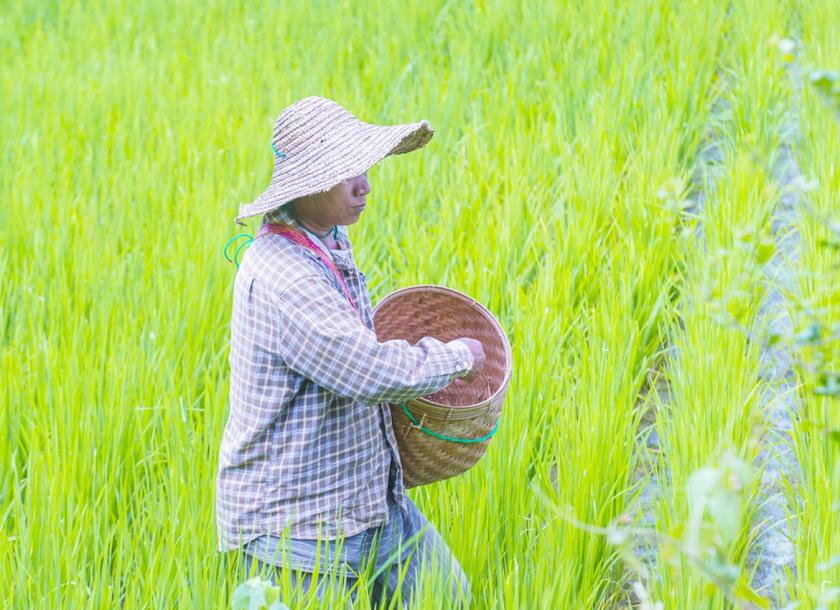Genomic rice breeding practices in Myanmar will be initiated with support from the Japan International Cooperation Agency (JICA)
8 Feb 2018
Japan International Cooperation Agency (JICA) and Myanmar’s agricultural research department are set to implement a genomic rice breeding initiative.
U Naing Kyi Win, director general of the Department of Agricultural Research (DAR) under the Ministry of Agriculture, Livestock and Irrigation (MOALI), and JICA signed a Record of Discussions (R/D) in Nay Pyi Taw on January 30 to launch a five-year project to strengthen rice breeding based on genomic technology. The representative from JICA was Kenichi Shishido, director general of the DAR.
This JICA-funded project will introduce paddy genetic breeding to the country in order to develop high-yield and pest and disease-tolerant rice varieties.
In the five-year span, research institutions in both countries will carry out joint activities to create promising rice lines suitable to rain-fed lowlands and uplands, as well as to enhance Myanmar’s existing breeding method. On the Japanese side, the agriculture faculty at Kyushu University and the bioscience and biotechnology centre at Nagoya University are involved.
JICA Myanmar told The Myanmar Times that agriculture is the most important sector for the country’s economy, and rice is the main crop for the majority of the population as staple food of daily consumption and as earning source of foreign exchange. Rice is the most important cereal in terms of food security here as it supplies more than half of the calories consumed by the national population. Hence scaling up rice production is a priority for Nay Pyi Taw.
While numerous high-yield rice varieties suitable to arable land have already been introduced, only 20 percent of Myanmar’s agricultural land planted with rice is irrigated, according to data from MOALI as of 2012. In order to secure stability in rice production, the sector should develop varieties adaptable to unfavourable cultivation environments, such as rain-fed lowlands. The project will employ DNA marker-assisted selection techniques in rice breeding and upgrade those varieties by introducing traits such as disease resistance and pest resistance. This approach will also be used to support the development of promising lines even at the research farms located in rain-fed lowlands and uplands.
As a result, new rice varieties, resistant to disease and insects and having high yields even in environments such as rain-fed paddy fields, will be created and widely used to improve the production level and thus farmer income.
Myanmar is under the tropical monsoon climate. There is huge potential in increasing production of paddy from the current level.
- JICA Myanmar
JICA Myanmar further added that the tropical monsoon climate means a huge potential in increasing paddy production.
The country, as British Burma, was for one time the largest rice exporter in Asia. Its rice export peaked during the 1930s, when the country sold over 3 million tonnes abroad. But now the sector is severely short of finance, expertise and machinery to modernise and reform. The productivity of rice grain has lagged behind neighbouring countries for decades. This is mainly due to low productivity from rain-fed lowlands which are said to account for 48 percent of Myanmar’s rice farms.
Currently, Nay Pyi Taw has earmarked efforts to build up research capacity building, and upgrade irrigation facilities as well as other production infrastructures, introduce agricultural machinery and fertiliser, disseminate agricultural technologies and develop better rice varieties.
JICA Myanmar said that, beyond reforming the agriculture sector to provide stability in supply for domestic demand, the project will help expand overseas market and support the national rice export strategy.
Demand for rice produced in Myanmar has risen to its highest level in 50 years in the current 2017-18 fiscal year, with rice exports estimated to have increased to around 2.5-8 million tonnes compared to the previous estimate of 2.2 million tonnes, according to U Khin Maung Lwin, assistant secretary of the Ministry of Commerce, last December.
(The Myanmar Times: https://www.mmtimes.com/news/myanmar-adopt-genomic-rice-breeding-practices-jica-support.html )











